Why Political Experience Matters: The Case for Competent Leadership
In Canada, many people enter politics because they are passionate about making a difference. But passion alone is not enough to govern effectively. Leadership requires experience, knowledge, and skill. Unfortunately, too many politicians take office without a solid understanding of how government functions.
When politicians lack real-world experience, they often rely on speeches and media attention rather than focusing on the hard work of policymaking. Social media has made this worse, encouraging leaders to prioritize catchy statements over real solutions. While communication is an important skill, leadership is about more than generating headlines—it’s about delivering meaningful results.
Having grown up in a working-class family, I appreciate leaders who work hard and produce results. My Dad was a small business owner and got me my first job, and my Mom was a school teacher who helped me pay for school. I had no connections to political families, elite schools, or influential figures—I just worked hard, applied for scholarships, sought out mentorship, and took advantage of every opportunity I could uncover.
I’m invited to regular lunch at the Union Club in Victoria—a space where business and political leaders gather—and I’m reminded of how different my path has been. Unlike many in positions of influence, my journey in public affairs has not been one of privilege but of perseverance and earned opportunities. A friend of mine, someone who also understands what it means to work for opportunities, encouraged me to write this article. Over lunch, we discussed how too many politicians today lack the experience needed to navigate governance effectively. This lack of preparation, we agreed, leads to performative leadership—where rhetoric overshadows results and image takes precedence over impact.
The Problem with Inexperience
How to Identify an Inexperienced Politician
Some politicians simply do not have the background needed to lead effectively. Here are key signs of inexperience:
Lack of Business or Policy Leadership Experience: The most important qualification for political leadership is experience in developing policies or leading businesses. Business executives, policy advocates, and professional civil servants often transition well into politics because they understand budgets, regulations, and managing people. Leaders with this background have a distinct advantage in securing their seat, advancing in leadership roles, contributing meaningfully to parliamentary committees, and earning positions in Cabinet. Lacking experience becomes evident when a political leader is publicly accountable for a policy outcome. It shows in their every thought, word choice, and political behavior that they truly do not know what they are doing—or what their leader, party, and constituency expect them to deliver.
Frequent Mistakes in Lawmaking: Inexperienced politicians often struggle to draft effective legislation, collaborate with other lawmakers, or successfully pass policies. Many of their ideas fail before ever reaching implementation, and their careers and constituency aspirations "die on the Order Paper."
Style Over Substance: Politicians who prioritize media optics, partisan attacks, and dramatic rhetoric over governance rarely create meaningful change. Leadership should be about results, not just soundbites.
Frequent Staff Turnover: Strong leaders build strong teams. If a politician constantly loses staff, it may be a sign of poor leadership and instability.
Failure to Deliver Results: If a politician has been in office for years but has little to show in terms of accomplishments, it’s a strong indicator that they lack the ability to be effective.
A study of Canadian politicians from 1993 to 2015 found that many Members of Parliament entered government with little to no prior experience. As a result, they often had to learn on the job, which led to slow progress and frequent missteps. Research from the Macdonald-Laurier Institute has further shown that many government failures are due to leaders lacking a deep understanding of governance.
The Value of Real Leadership Experience
Before seeking higher office, individuals should gain leadership experience where they are responsible for managing people, budgets, and policies. Here are some of the best ways to prepare for political leadership:
Policy and Business Leadership: Strong leaders have experience shaping policies or running businesses. They understand financial management, decision-making, and how to turn ideas into action. In business, results matter—empty talk isn’t enough.
Municipal Government (Mayor, City Councilor, County Reeve): Local government leaders manage communities, deal with real-world challenges, and make important decisions that directly affect people’s lives.
School Board Leadership: School board members oversee education policies, budgets, and community needs, providing valuable governance experience that translates well into higher office.
Developing Leadership Skills at Carleton University
One way to prepare for a career in politics is through formal education. Carleton University offers a Master’s in Political Management (MPM), Canada’s first graduate program designed to train political leaders. This program equips future politicians and political staff with the skills needed to govern effectively.
MPM students complete at least 375 hours of work in a political setting, ensuring they gain practical experience before entering government. The program teaches policy development, political communication, and decision-making—building a strong foundation for future leaders.
Why Canada Needs Experienced Leaders
Canada needs leaders who not only have vision but also the knowledge and skills to turn that vision into reality. Political parties and voters should prioritize candidates with proven leadership experience.
At the same time, we need to raise the level of political discussion. Leaders should be challenged on their policies, values, and ability to implement real solutions—not just on their ability to deliver compelling speeches or generate media attention. Democracy works best when voters judge leaders based on the quality of their ideas and their capacity to execute them, rather than on temporary popularity.
If we fail to prioritize experience, we will continue to see ineffective leadership, weak policy decisions, and declining public trust in government. The future of Canada depends on electing leaders who are prepared, competent, and ready to turn meaningful ideas into action.





